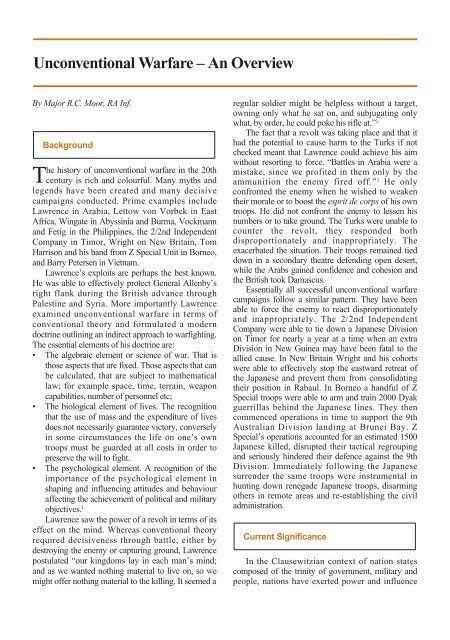ISSUE 136 : May/Jun - 1999 - Australian Defence Force Journal
ISSUE 136 : May/Jun - 1999 - Australian Defence Force Journal
ISSUE 136 : May/Jun - 1999 - Australian Defence Force Journal
- No tags were found...
You also want an ePaper? Increase the reach of your titles
YUMPU automatically turns print PDFs into web optimized ePapers that Google loves.
Unconventional Warfare – An OverviewBy Major R.C. Moor, RA Inf.BackgroundThe history of unconventional warfare in the 20thcentury is rich and colourful. Many myths andlegends have been created and many decisivecampaigns conducted. Prime examples includeLawrence in Arabia, Lettow von Vorbek in EastAfrica, Wingate in Abyssinia and Burma, Vockmannand Fetig in the Philippines, the 2/2nd IndependentCompany in Timor, Wright on New Britain, TomHarrison and his band from Z Special Unit in Borneo,and Barry Petersen in Vietnam.Lawrence’s exploits are perhaps the best known.He was able to effectively protect General Allenby’sright flank during the British advance throughPalestine and Syria. More importantly Lawrenceexamined unconventional warfare in terms ofconventional theory and formulated a moderndoctrine outlining an indirect approach to warfighting.The essential elements of his doctrine are:• The algebraic element or science of war. That isthose aspects that are fixed. Those aspects that canbe calculated, that are subject to mathematicallaw; for example space, time, terrain, weaponcapabilities, number of personnel etc;• The biological element of lives. The recognitionthat the use of mass and the expenditure of livesdoes not necessarily guarantee victory, converselyin some circumstances the life on one’s owntroops must be guarded at all costs in order topreserve the will to fight.• The psychological element. A recognition of theimportance of the psychological element inshaping and influencing attitudes and behaviouraffecting the achievement of political and militaryobjectives. 1Lawrence saw the power of a revolt in terms of itseffect on the mind. Whereas conventional theoryrequired decisiveness through battle, either bydestroying the enemy or capturing ground, Lawrencepostulated “our kingdoms lay in each man’s mind;and as we wanted nothing material to live on, so wemight offer nothing material to the killing. It seemed aregular soldier might be helpless without a target,owning only what he sat on, and subjugating onlywhat, by order, he could poke his rifle at.” 2The fact that a revolt was taking place and that ithad the potential to cause harm to the Turks if notchecked meant that Lawrence could achieve his aimwithout resorting to force. “Battles in Arabia were amistake, since we profited in them only by theammunition the enemy fired off.” 3 He onlyconfronted the enemy when he wished to weakentheir morale or to boost the esprit de corps of his owntroops. He did not confront the enemy to lessen hisnumbers or to take ground. The Turks were unable tocounter the revolt, they responded bothdisproportionately and inappropriately. Theexacerbated the situation. Their troops remained tieddown in a secondary theatre defending open desert,while the Arabs gained confidence and cohesion andthe British took Damascus.Essentially all successful unconventional warfarecampaigns follow a similar pattern. They have beenable to force the enemy to react disproportionatelyand inappropriately. The 2/2nd IndependentCompany were able to tie down a Japanese Divisionon Timor for nearly a year at a time when an extraDivision in New Guinea may have been fatal to theallied cause. In New Britain Wright and his cohortswere able to effectively stop the eastward retreat ofthe Japanese and prevent them from consolidatingtheir position in Rabaul. In Borneo a handful of ZSpecial troops were able to arm and train 2000 Dyakguerrillas behind the Japanese lines. They thencommenced operations in time to support the 9th<strong>Australian</strong> Division landing at Brunei Bay. ZSpecial’s operations accounted for an estimated 1500Japanese killed, disrupted their tactical regroupingand seriously hindered their defence against the 9thDivision. Immediately following the Japanesesurrender the same troops were instrumental inhunting down renegade Japanese troops, disarmingothers in remote areas and re-establishing the civiladministration.Current SignificanceIn the Clausewitzian context of nation statescomposed of the trinity of government, military andpeople, nations have exerted power and influence

















